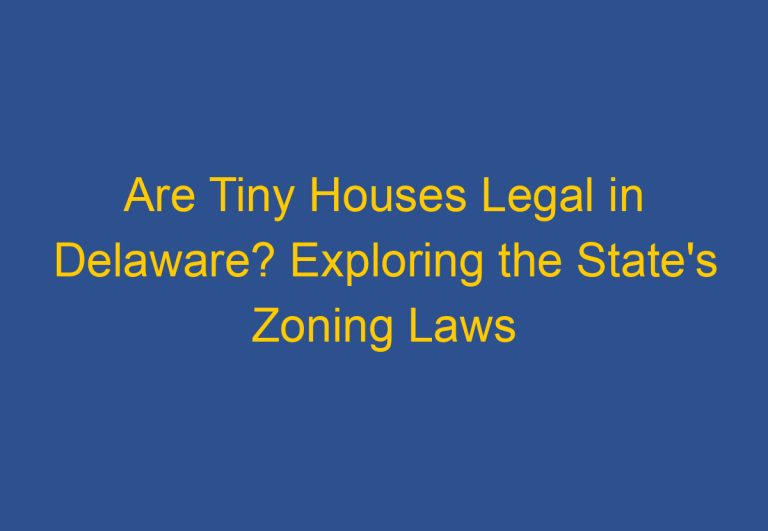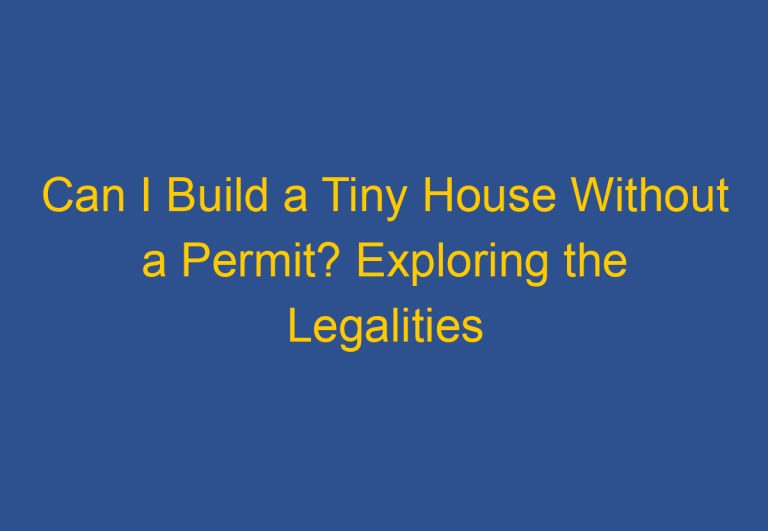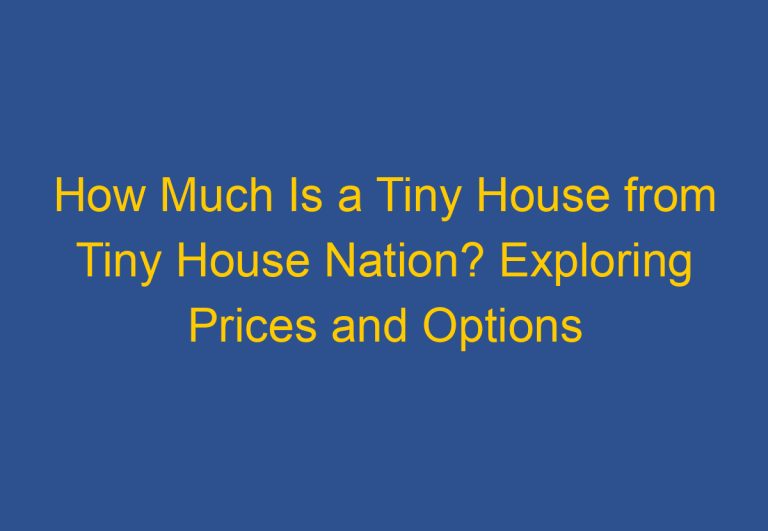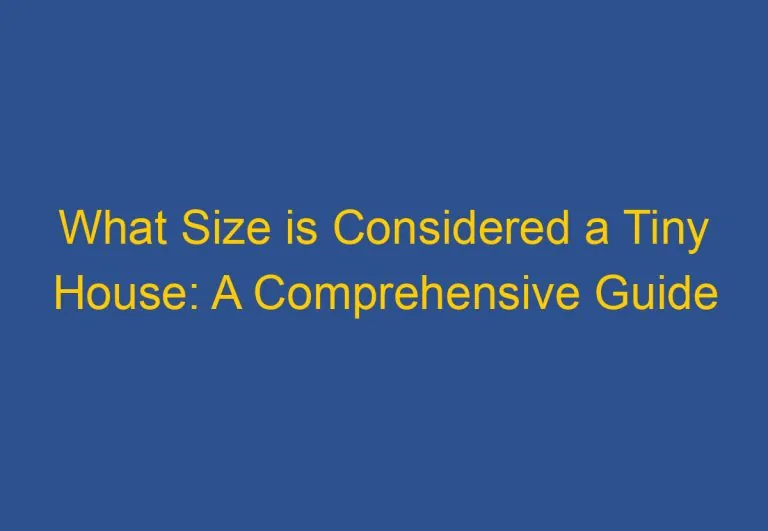Tiny House Listings: What States Allow Tiny Homes On Wheels
As the trend for tiny homes continues to gain popularity, many individuals are considering downsizing their living space and embracing a more minimalistic lifestyle.
However, before making the decision to purchase or build a tiny home, it’s important to understand the various regulations and laws regarding these dwellings. In this article, we will explore the states that allow tiny houses and the requirements needed to own and live in one.
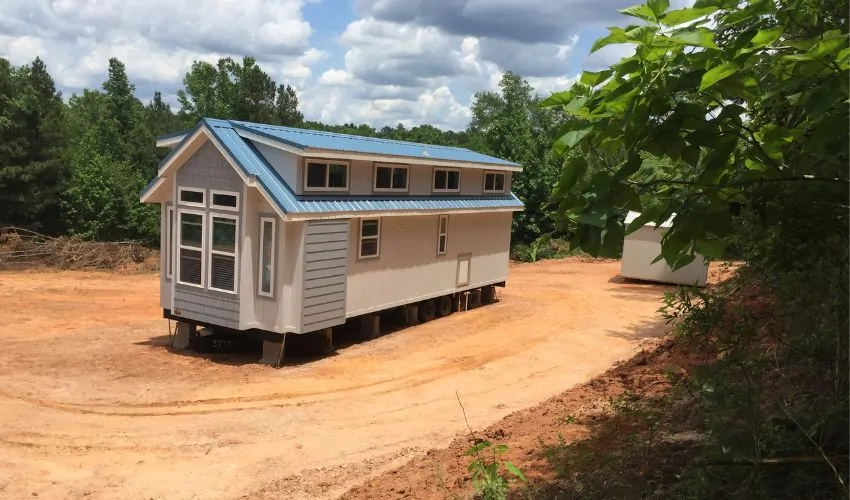
What is a Tiny House?
A tiny house is a small, efficient, and often mobile home that typically ranges in size from 100 to 400 square feet. These homes have become increasingly popular among individuals who are seeking a simpler and more sustainable way of living.
Tiny homes can be built on wheels or a foundation and can range from simple cabins to luxurious homes with all the amenities of a larger house. Due to their small size, tiny homes are often more affordable to build and maintain, making them an attractive option for many people.
Which States Allow Tiny Houses?
The rules and regulations surrounding tiny houses vary from state to state, and even within individual cities and towns. Some states have embraced the tiny house movement and have created specific regulations to accommodate these dwellings, while others have yet to fully recognize them as a legitimate housing option.
Here are the states that currently allow tiny houses, along with some of the requirements needed to own and live in one:
WHERE ARE TINY HOMES LEGAL IN THE US?
The most popular states which allow tiny homes on wheels are:
- California
- Colorado
- Florida
- Idaho
- Maine
- Massachusetts
- Michigan
- Minnesota
- Oregon
- Texas
- Wisconsin
The Most Popular States That Allows Tiny Houses in the US.
California
California has some of the most lenient laws regarding tiny houses. In 2016, the state passed legislation that allows tiny homes to be built on wheels and registered as RVs, as long as they meet specific safety and construction standards. Additionally, some cities in California, such as Fresno, have created specific zoning regulations for tiny homes on foundations.
Colorado
In Colorado, tiny homes can be built on foundations or on wheels, but they must meet specific building codes and zoning regulations. The state has also created a task force to study the feasibility of creating a tiny home village to help combat homelessness.
Florida
Florida has recently passed legislation allowing tiny homes to be built on foundations, as long as they meet certain safety and construction standards. However, zoning regulations vary by city and county, so it’s important to check with local authorities before building a tiny home.
Idaho
In Idaho, tiny homes can be built on foundations or on wheels, as long as they meet specific building codes and zoning regulations. The state has also created a task force to study the feasibility of creating a tiny home village to help address affordable housing issues.
Maine
Maine allows tiny homes to be built on foundations or on wheels, as long as they meet specific building codes and zoning regulations. The state has also created a task force to study the feasibility of creating a tiny home village to help address affordable housing issues.
Massachusetts
Massachusetts allows tiny homes to be built on foundations or on wheels, but they must meet specific building codes and zoning regulations. Additionally, some cities and towns in the state have created specific zoning regulations for tiny homes.
Michigan
In Michigan, tiny homes can be built on foundations or on wheels, as long as they meet specific building codes and zoning regulations. However, some cities and towns in the state have yet to fully recognize tiny homes as a legitimate housing option.
Minnesota
Minnesota allows tiny homes to be built on foundations or on wheels, but they must meet specific building codes and zoning regulations. Additionally, some cities in the state have created specific zoning regulations for tiny homes.
Oregon
Oregon has some of the most progressive laws regarding tiny homes. The state allows tiny homes to be built on foundations or on wheels and has created specific building codes and zoning regulations for these dwellings. Additionally, the city of Portland has even created a tiny home hotel to showcase different designs and provide temporary housing options.
Texas
Texas allows tiny homes to be built on foundations or on wheels, but they must meet specific building codes and zoning regulations. Additionally, some cities in the state have created specific zoning regulations for tiny homes.
Wisconsin
Wisconsin allows tiny homes to be built on foundations or on wheels, but they must meet specific building codes and zoning regulations. Additionally, the city of Racine has created a tiny home village to help address affordable housing issues.
It’s important to note that the laws and regulations regarding tiny homes are constantly evolving and may differ from city to city within a state. It’s crucial to do thorough research and consult with local authorities before building or purchasing a tiny home.
Benefits of Living in a Tiny House
Living in a tiny home offers a range of benefits beyond just cost savings. Tiny homes can be more environmentally friendly, require less maintenance, and promote a simpler and more intentional way of living. Additionally, tiny homes can be used as an alternative housing option for those experiencing homelessness or as a way to address affordable housing shortages.
HOW DO YOU KNOW IF TINY HOUSES ARE ALLOWED IN YOUR STATE?
To know if tiny houses are allowed in your state, you should look into the building and zoning laws specific to your state. Tiny homes are legal in all US states, but some states have specific laws for them. Some states that are in the process of making tiny houses on wheels legal include Maine, Minnesota, Missouri, Florida, Texas, and Colorado. California is one of the tiniest house-friendly states.
Final Thoughts
As the tiny house movement continues to gain popularity, more states are recognizing the benefits and potential of these small, efficient homes.
While the laws and regulations regarding tiny homes may vary from state to state and city to city, it’s important to do thorough research and consult with local authorities before building or purchasing a tiny home.
With careful planning and consideration, a tiny home can offer a simple and sustainable way of living that is both affordable and environmentally friendly.
Build Your Own Dream Tiny House Today
Are you ready to embrace the simplicity and affordability of tiny living? Building your own tiny home can be a rewarding and eco-friendly experience. By downsizing your living space, you’ll not only save money, but also reduce your environmental footprint.
While living in a tiny home may not be suitable for everyone, we’re here to make the process as easy and enjoyable as possible. If you’re up for the challenge and ready to own a tiny home, contact us today. We’re happy to answer any questions and address any concerns you may have about building your dream tiny home.
FAQ
New York allows tiny houses as backyard additional dwelling units (ADUs) in most counties. The state has adopted something called “Appendix Q” within its Residential Code, which outlines the requirements for tiny house construction.
However, New York is generally considered to be the least friendly state in America when it comes to tiny homes. Appendix Q requires that habitable space and hallways have a ceiling height of not less than 6 feet 8 inches (2032 mm).


